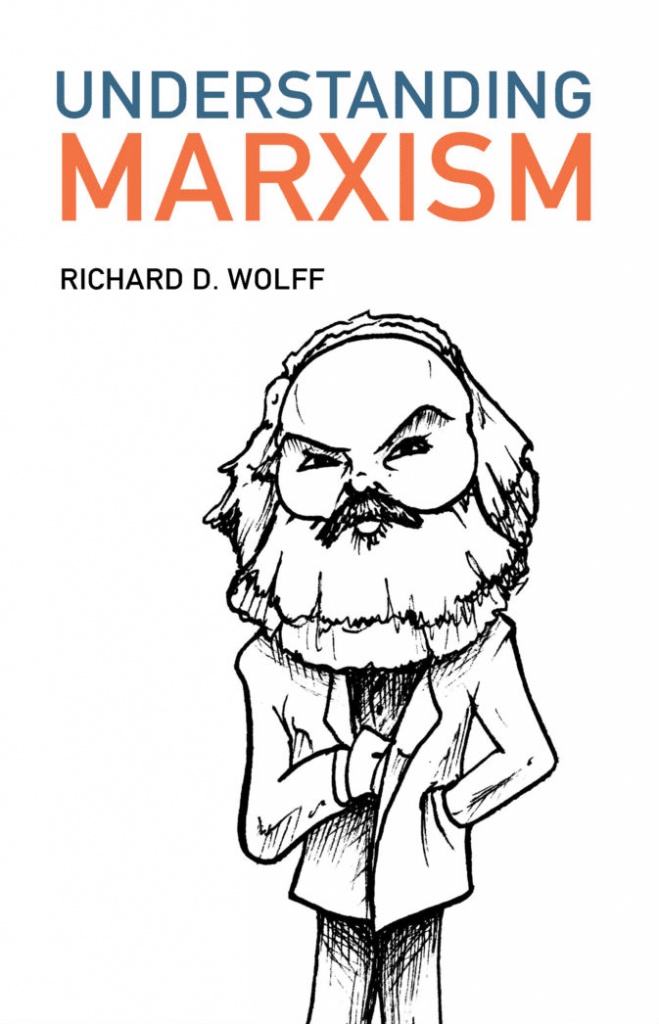
Richard Wolff in Understanding Marxism concisely introduces Marx’s essential arguments on exploitation in capitalism, and workers’ democracy, finds Graham Kirkwood

I found myself racking my brains the other day for a concept I used to understand as a means of explaining why capitalism could make the necessary changes to avert climate catastrophe, but left to its own devices is unlikely to do so. Karl Marx, over 150 years ago wrote this in his preface to A Contribution to the Critique of Political Economy:
‘At a certain stage of development, the material productive forces of society come into conflict with the existing relations of production or – this merely expresses the same thing in legal terms – with the property relations within the framework of which they have operated hitherto. From forms of development of the productive forces these relations turn into their fetters. Then begins an era of social revolution.’
Applied to climate change this could mean that the technology to rescue humanity from this crisis exists or can be developed, but due to the economic and political structures we live under, capitalism as a system finds itself unable to make the changes necessary.
Although Marx analysed capitalism in its infancy, his findings are proving to be extremely relevant to the problems we face today. There is a lot of confusion over what he stood for, however. The BBC, during the Chinese state’s recent seventieth birthday celebrations casually described its current leaders as Marxist; Jeremy Corbyn is called a Marxist by sections of the press and Tory politicians. The term is bandied about so much that it loses all meaning.
Richard Wolff, emeritus professor of economics at the University of Massachusetts and founder of Democracy at Work, has made a timely contribution to the debate with a useful little book introducing the ideas of Marxism. It puts current events in a historical perspective; even capitalism (and even Brexit!) are only stages in human history. Capitalism, Marx called the last stage of the ‘prehistory of human society’. Unfortunately, however, it is proving to be an extraordinarily destructive stage. The problem we have is that it has produced forces capable of destroying humanity and every living thing along with it. There are currently 13,865 nuclear weapons in the world, 90% of which are owned by the USA and Russia with nearly 2,000 of these kept in a state of high operational alert. The trend towards reducing the numbers of these weapons has slowed as the USA and Russia and smaller nuclear states update and modernise their arsenals. Sitting around waiting for capitalism to collapse is not an option.
Recent years have seen an increase in interest in Marxism in the US, partly due to the popularity of those such as Bernie Sanders and Alexandria Ocasio-Cortez. Talk of socialism, long banished from American discourse and dismissed as un-American, is now a topic for discussion. Donald Trump identifies ‘the spectre of socialism’ as ‘one of the most serious challenges our countries face.’
Wolff states on the book cover that ‘to achieve a society that exhibits liberty, equality, fraternity and democracy, the object to change first and foremost is the organisation of production.’ This is the central theme of the book, a question that Marx asked. Why had capitalism failed to produce its stated aims following the French and American revolutions: ‘that all men are created equal, that they are endowed by their Creator with certain unalienable Rights, that among these are Life, Liberty and the pursuit of Happiness.’ How could revolutions with such worthy goals result in the abomination of slavery? Marx came to the conclusion that the reason was that employers control not only the means of production but also society (p.22).
He goes through the concepts of how competition develops between the capitalists (p.51); how labour power is commodified (p.41); and how capitalism is prone to crises and instability (p.60). Any individual, he says ‘exhibiting a personal instability comparable to the economic and social instability of capitalism would long ago have been required to seek professional help and to make basic changes’ (p.61). But capitalism limps on and threatens to take us all down with it. Until workers get to decide democratically what to do with the surplus generated by their labours, so it will continue.
This is an excellent little book and will be a good read for anyone wanting to introduce themselves to Marx’s key ideas, particularly around the issues of democracy, or to anyone wanting to refresh their understanding.

